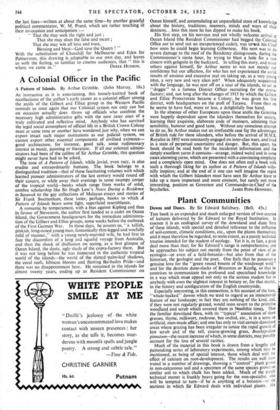A Colonial Officer in the Pacific
A Pattern of Islands. By Arthur Grimble. (John Murray. 18s.)
As instructive as it is entertaining, this loosely-knitted book of recollections of the author's early career as a colonial officer among the atolls of the Gilbert and Ellice group in the Western Pacific reminds us once again that our Colonial system not only can but on occasion actually does throw up officials who combine the necessary high administrative gifts with the now rarer ones of a truly cultivated and reflective mind. Anybody who has survived the tepid social atmosphere of official life in a British Crown Colony must at some time or another have wondered just why, when we can export intact such major institutions as our judicial system, we cannot export other essential components of civilised existence= good architecture, for instance, good talk, some ruclimentary interest in music, painting or literature. If all our colonial admini- strators had been of the calibre of Sir Arthur Grimble, this question might never have had to be asked. The tone of A Pattern of Islands, while jovial, even racy, is also erudite and extraordinarily humane. The book belongs to a distinguished tradition—that of those fascinating volumes with which learned pioneer administrators of the last century would round off their careers, or while away their evenings in some swampy corner of the tropical world—books which range from works of solid, sombre scholarship like Sir Hugh Low's Notes During a Residence in Sarawak to the gay collections of Malayan essays and stories of Sir Frank Swettenham, these latter, perhaps, books to which A Pattern of Islands bears some light, superficial resemblance. A romantic by temperament, with a bias against Kipling and thus in favour of Stevenson, the author first landed as a cadet on Ocean Island, the Government headquarters for the immediate administra- tion of the Gilbert and Ellice groups, some weeks before the outbreak of the First German War. In those days, he assures us, "a tallish, pinkish, long-nosed young man; fantastically thin-legged and woefully mild of manner," with a young newly-married wife, he had first to face the discomfort of a long and squalid voyage from Australia, and then the shock of disillusion on seeing, as a first glimpse of Ocean_Island, the dusty, ugly sheds of the copra-factory there. But it was not long before he was immersed in the authentic tropical world of the islands—the world of _the slatted -palm-leaf shadows, the coral reefs, hibiscus blooms and flaming Barbados Pride—and there was no disappointment here: He remained in the islands for almost twenty years, ending up as Resident Commissioner on ' Ocean himself, and accumulating an unparalleled store of knowledge about the history, traditions, manners, minds and ways of their denizens., Into this store he has dipped to make his book.
His first step, on his nervous and not wholly welcome arrival at Ocean Island (the Resident Commissioner had begged the Colonial Office not to send out an inexperienced cadet), was tomsk his Chief how soon he could begin learning Gilbertese. His next was to do severe damage to the roof of the Residency dining-room, during the Commissioner's siesta hour, by trying to blast a hole for a new cistern with gelignite in the backyard. In telling this story, and many others against himself, Sir Arthur seems to win not merely our confidence but our affection, for who has not experienced the awful results of anxious and excessive zeal on taking up, as a very young i titan, a very new and very alien job? When adequately acquainted with the language, he was sent off on a tour of the islands, to act as "doggie" to a fanious District Officer recruiting for the copra- factory; and, not long after the changes of 1915 by which the Gilbert and Ellice Protectorate became a Colony, he was given his first district, with headquarters on the atoll of Tarawa. From then on he seems to have had, more or less, a delightfully free hand.
In the absence of other Europeans upon these atolls. the Grimbles were happily dependent upon the islanders themselves for society, learning their exquisite, elaborate code of manners, admiring their sensibility, humour and good taste. Without any conscious attempt to do so, Sir Arthur makes out an irrefutable case fo; the advantages of British rule for these islanders, who before the arrival of H.M.S. Royalist in 1892 were constantly engaged on inter-clan wars, and lived in a state of perpetual uncertainty and danger. But, this apart, his book should be read both for the incidental information and the simply excellent yarns it contains—strange, indeed weird and in some cases alarming yarns, which are presented with a convincing simplicity and a completely open mind. One does not often end a• book with such a thorough liking for its author as A Pattern of Islands willy- nilly inspires; and at the end of it one can well imagine the regret with which the Gilbert Islanders must have seen Sir Arthur leave to take up a more important and more eminent, but surely not more interesting, position as Governor and Commander-in-Chief of the


































 Previous page
Previous page